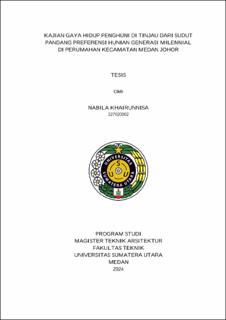| dc.description.abstract | Urban life is increasingly becoming the main focus in the development of urbanization in various countries, including Indonesia. With rapid economic growth, the millennial generation, which is the dominant group in urban society, has a significant role in determining lifestyle trends, especially regarding residential preferences. Millennials tend to have different preferences when it comes to housing than previous generations. This generation is the productive generation (25-45 years), who on average already work and have a family. The millennial generation is considered a group that influences lifestyle trends and residential preferences. The character of the millennial generation who grew up with technology, is involved with social issues, focuses on career advancement and is flexible and mobile, this influences their residential preferences such as housing that is equipped with good technological infrastructure, choosing housing that is environmentally friendly or strategically located, close to with a business center or area that offers job opportunities and self-development activities, close to parks, running tracks or fitness centers and residences that are easy to reach by public transportation. This research aims to examine the lifestyle of housing residents in Medan Johor District with a focus on the residential preferences of the millennial generation. This research method uses a qualitative approach with data collection techniques through questionnaires and observation. Respondents were selected using snowball sampling. Data analysis was carried out using content analysis techniques to identify residential and lifestyle preference patterns. The research results show that the millennial generation tends to have housing preferences that prioritize affordability, transportation accessibility and an environmentally friendly environment. They also tend to choose residences that support an active lifestyle, including access to fitness centers, open areas for recreation, and easy access to hangout places such as cafes and shopping centers. These findings provide significant implications for housing developers and related stakeholders in designing and developing housing that suits the preferences and lifestyle of the millennial generation in Medan Johor District. | en_US |


